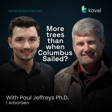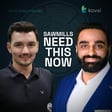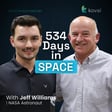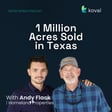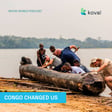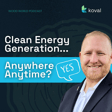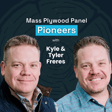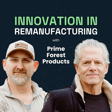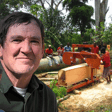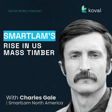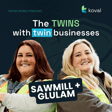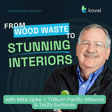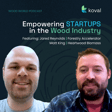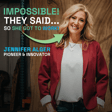Colville Team's Innovative Approach
00:00:00
Speaker
What value do you think that the Colville team that Padeem is putting together is bringing to the industry? Well, I think that you're bringing a clean perspective and you're bringing an exciting perspective to an industry that is exciting when you lift up the hood and not realize that, like, okay, SpaceX, you know, we need some parts for that.
Navigating the 2008 Financial Crisis
00:00:30
Speaker
Meet Justin Williams, a visionary engineer and relentless entrepreneur. Justin took the helm of the Williams and White group in the midst of the 2008 financial crisis and charted a path to unprecedented growth.
00:00:44
Speaker
pushing the company into new sectors and expanding their international markets. His story is a testament to bold innovation and intentional diversification. Join us as he shares the challenges he overcame and the strategies he used to transform a family business into an international success and how he's using what he learned to help other business leaders to do the same.
Specialization and Expansion in Industries
00:01:06
Speaker
What is a really broad category and where in the wood industry does Williams and White play?
00:01:12
Speaker
Well, we're all about the tooling, you know, side of it. So that's circle saws, band saws, knives, all the cutting tools. And we're an OEM. We produce the machinery for the production and maintenance of those tools as well as all the support devices, your mill maintenance equipment. So predominantly our clientele falls into the sawmills themselves.
00:01:34
Speaker
a little bit into the other wood production areas also, but not as much into the pulp and paper side of things or, or those other elements, uh, bit into the remand plants. But the lion's share of our target market is the primary breakdown sawmill. And then we get into what we call the secondary industry quite heavily as well. So that's a secondary transformation of wood, furniture production, the sharpening shops that come with that.
00:02:02
Speaker
and we are branching into those industries quite a bit as well. And then outside of the wood industry, we're quite heavy in metal. So that's the tooling around that, your round tooling, your end mills, those kinds of sharpening machinery. And that's really where we play as a company.
00:02:18
Speaker
That is really cool. Justin, I know that when we're at Sawmills specifically with our fail crews and we're getting out there to see content or make content, we see your machines, your Williams and White's, like the Saw guide dressing machines or others that are out there. So it's really cool to put the face of you, the CEO of the company and the machinery that's out there in the field together. And we get a little bit of your backstory. I'm just curious about, did you come up from an engineering path
00:02:47
Speaker
more technical or how did
Justin Williams' Background and Influence
00:02:49
Speaker
you? Yeah, I'm a registered professional engineer in electrical engineering. Most of my focus would be robotics. I went to the University of British Columbia here in BC, Canada. Pretty wood-oriented university in many ways. Foreign tech has a research institute out of there, now FP Innovation. That's foreign tech back when I was
00:03:12
Speaker
There was even a Fletcher challenge for some of the, some of the guys that have memory in this industry Fletcher challenge lecture theater. I remember at UBC that you could go to, I did electrical engineering there. I did a commerce minor as well. And in my career, I've kind of.
00:03:28
Speaker
been really focused on the product dev as well as the business development and sales front of the business. That's kind of where I, where I play and where I really bring to the team and push things, a lot of expansion.
00:03:44
Speaker
So that's kind of my background on a technical side. It's that engineering and robotics. I actually started a robotic spin-out called Remtech Systems and we spun that out of the company and sold it to the employees that were working with us. That business is still doing great. They're predominantly in the food industry and so they do robotics integration, pick and place and that kind of stuff. A lot of automation work there.
00:04:06
Speaker
And then we've got our machining and fabricating company where we do contract manufacturing for a lot of different industries, predominantly aerospace and oil and gas, mining, the big forestry guys
Cultural Enrichment and Global Experiences
00:04:19
Speaker
as well. We're a big supplier of contract manufactured parts for many OEMs.
00:04:25
Speaker
And then I grew up in the business. So during my university degree, I actually traveled quite a bit. I took a couple of gap years. I learned French. I volunteered for a year going across Canada in a bunch of communities. So I've lived in almost every province. I lived in
00:04:43
Speaker
Montreal as well and learn French just because I kind of wanted to do that I I got inspired by Met a bunch of youth from across Canada and saw that people speak French on a regular basis. So that was pretty cool And then I went back to UBC. So that was a gap here there In which I did a program called Katima Vic, which is an amazing I should give the plug to the Canadian government It's like a they teach you a lot about group dynamics and and you know
00:05:13
Speaker
working with people in the community. So I worked in like a health center or we helped build a trail in Newfoundland to connect the Trans-Canada Trail. Then went back to UBC, continued my engineering degree. And then I took another year in which I actually went and lived in Russia in a small village doing kind of aid work in a very small village on the Baltic Sea. Learned a very tiny bit of Russian there. Yeah. I lived, I lived with a woman who
00:05:42
Speaker
In the apartment, there was no shower and no, uh, clean drinking water. So you can imagine like the tiny size of the town. And it was a very, very cool experience. And then, uh, went back to UBC, finished off my degree and moved to Montreal for a bit. And I remember I called my dad.
00:06:02
Speaker
And it was, okay, I'm going to start working full time. And he said, well, before you come back, you should just go on the road and see all our customers out in Eastern Canada. And so I spent, I think it was six or eight weeks. I just got in a car and went to our different partners and distributors and mills and.
00:06:18
Speaker
I went all across Ontario, Quebec, the Maritimes, all kind of for multiple weeks. I was just on the road and for many, many years of my career, even today, uh, I've never, I've never really stopped that. I'm always, there was one year I traveled 145 days in the year. And so it was a lot of travel and then.
00:06:41
Speaker
during my career with that focus in the product development sphere. You know, I've got multiple patentated mentions that I've worked on with our team and really it's about team building. You know, it's about bringing people together, you know, and that's been able to catapult our company.
00:06:58
Speaker
And then there was a point in my career where I moved over to Europe and that kind of changed our thinking as well and really broadened my horizons to see that area of the world and live there for a while.
European Expansion and Strategic Partnerships
00:07:14
Speaker
See just the broadness kind of what you spoke about the dim that The the industry is just so broad and so big and there's so many Interesting opportunities that we've been integrating those into Williams and white the last number of years and we've seen a huge impact from that What year was the Europe portion of your? Career. Well, I've got a two-year-old daughter now and my then girlfriend now wife and I moved
00:07:44
Speaker
back to Canada, I think, I guess it would be four years ago. And it was three years that we were in London, England, which isn't really a much of a wood spot, but it's a great hub with a lot of airports. And I was on an airplane constantly. Yeah. That was a bit of a funny story, how I ended up there actually. I was, you want to share it? Yeah, yeah, sure. Yeah. I was, uh, I was dating the girl who is now my wife and
00:08:13
Speaker
She had told me when we first met, she's like, I'm moving, I'm moving to England, moving to London. And I was like, oh, OK, that's great. I guess you're going to move to London. And so we did it for a while. She moved to London. And then my friend from England was just visiting me and was like, well, you know, we do a lot there. We you know, there's a lot of of.
00:08:36
Speaker
of industry and an economy. We don't have a lot of trees in England, but my family has a company making shoe parts and we send our little cutting tools and knives to this guy down the road and he sharpens them for us. Do you think he'd be your customer? I decided to hop on an airplane and
00:08:57
Speaker
Drove around England and actually ended up selling a machine on that trip, uh, to a company called Bennett saw a great company, good client of ours today, Bennett saw. And, uh, drove back down to London and went to, you know, my now wife and said, Hey, I just sold a machine in England. Maybe I could build a business out of this. And next thing you know, we've now got strategic partners in Germany, France,
00:09:28
Speaker
Throughout Europe, we've got an install that we're building for a huge saw manufacturer in Poland right now that's going to be shipping out. We've put machines in Finland. The GDX that you mentioned, we got a GDX running beside a Colmak line in Finland.
00:09:44
Speaker
You know, uh, yeah, it's been great. It's been amazing. And, uh, and it, it really opened up the world for Williamson white and changed the whole, the whole game of how we thought about the industry. And it all kind of spurred off of this, uh, this girl that I met that liked to ride, you know, crotch rocket motorcycles and, and have a great time. And as a, she's an accountant herself and want to work in finance over there. And.
00:10:10
Speaker
It really broadened our horizons. Yeah, it's a cool story. That's a cool story, man. And it sounds like along with the college years when you were taking the time to go and explore and do stuff. So you were just locked into where you were ordered, raised. And where is that? Where were you? I'm born in Vancouver.
00:10:30
Speaker
Yeah. Yeah. So you didn't basically stay there. You went abroad and traveled and got that experience. What did that do to you personally, your perspectives of wood industry and beyond? Oh, just I encourage every, every person, young, old, but especially young to, uh, grab a bag and start travel. I've been to over 50 countries. I was in every single continent in one year at one, you know, in one, uh, one year while I've touched every continent and
00:10:59
Speaker
You know, we do business everywhere now. Like we do business. Uh, we sold machinery in Taiwan. We sold to a sawmill in Taiwan. Do you think there's many sawmills in Taiwan? Most people wouldn't think that we do, you know, we've got installs in Japan, Australia, New Zealand, Argentina, Brazil, Chile, like all over. And absolutely. My dad used to travel a lot when I was growing up as well.
00:11:25
Speaker
It was predominantly to Australia, New Zealand, a little bit to Chile. He was down there with Canadian Connection, not as not so much to Europe. You know, the going to Europe. And especially going to Ligna, we started to go to Ligna. I got funny story about that one, too, if you want to hear it. Absolutely. What about Ligna?
00:11:47
Speaker
Okay. So the first time we ever went to Ligna. So I love Ligna and all the people that put on Ligna are good friends and Williams and white. We love you, but here's the first story of how we were created. It's quite hilarious. We get our stand and we're ready to go. And I arrived there and I'm, I'm going to do the show. You know, here we go.
00:12:10
Speaker
and we're at a 10 by 10 effectively, like a 10 by 10, but if it's a little bit bigger there, I think it's a, like, whatever. It's not meter, it's three meter. Three meter by three meters. Yeah.
00:12:21
Speaker
So I'm in a 10 by 10, except there's, there was a pillar. Effectively in the middle of our stand that is like three or four feet down or it's like a three down concrete pillar that holds the whole building up. And our stand has been built around this pillar. Oh my goodness. We're trying to like, we're trying to get our wall up. We're trying to put our, it was, it was hilarious. It was so funny.
00:12:50
Speaker
Yeah. I don't know if you know this show grind tech or grind hub now. It's specific to grinding, but there's a lot of saw production stuff there. I had the same thing happen there. I went to grind tech first time in what town is it in? It's outside of Munich. It's a little bit west of Munich and it's I'm not remembering the name of the town.
00:13:19
Speaker
But they're there. And first time I went to that show, they put me in the hallway between two, like between two holes. So people are just like quickly walking by trying to get the ball. Oh, and there's a lot of, a lot of quirks that happen with these, uh, in-person trade shows. And I'm sure you've been to a bunch and we'll have a lot of a pile of stories there about the differences.
00:13:46
Speaker
Yeah, but the the going to Ligna was a game changer and and just the international element of our company. And, you know, and that's that's that's how Williams and White works today. A lot of our businesses in the United States of America and we really appreciate that that market and Williams only USA is is based out of Atlanta. And, you know, we're there. We're we're we're throughout the United States and in every state every day.
00:14:15
Speaker
but the internationalness of our business is definitely a huge success story and something that I'm very proud that our team has been able to make happen.
Diversification and Stability Strategies
00:14:24
Speaker
How did you leverage that to grow into where you are today? I mean, like that was massive hit to the financial crisis just to everything. Yes. Yeah, yeah, yeah. That was bad. Can you share about how you, what happened? How did you persevere? How did you get through that and led to growth today? Well, firstly, you know,
00:14:45
Speaker
It was it was there's no getting around saying that it was just terrible. It was a terrible time. You know, I remember 2010 Olympics.
00:14:54
Speaker
I think it, I think it was optimal because I'm pretty sure I was chatting with them. They rented part of their yard out to the Olympic committee to be able to like just build stuff for the Olympics because they're, they're pretty close to us here in Vancouver. Great people, great people as well. We just did everything to diversify. Um, and it's part of the reason that nowadays our contract manufacturing business is very strong and it's in the industries that it is such as aerospace and
00:15:23
Speaker
mining and oil and gas and power generation and all of those kind of things. Marine, we do a ton of marine, you know, we're building a carbon capture machine right now for one of our clients. We do a lot of different stuff. And so when the when the wood sector was was hurting.
00:15:41
Speaker
we were continuing to be able to have other elements of our business that were doing well. And then we were able to reinvest those funds into the product development side of things. And so reinvest in product dev through endeavors in other industries as well, making sure that our businesses is in those positions of strength. We're also a very under leveraged company, so
00:16:09
Speaker
I'm very proud and very impressed by what a number of companies in this industry have been able to do with the roll-ups and things like that, but those tend to be leveraged buys. Williams & White tends to be a much less leveraged business in that sense, and so when those harder times come,
00:16:29
Speaker
we're able to weather those storms very effectively. And so that comes down to, you know, business management, cash management, and ensuring that we're, we recognize that the wood industry can be very boom bust. It's been this way forever. Even during this last crazy boom, you know, I was talking with my leadership team about
00:16:53
Speaker
there'll be a backside of this and we better be ready for it. And I think that right now the only industry has slowed down. That would be an honest statement. And so 2008, you know, we were able to just put ourselves into those good positions and
00:17:14
Speaker
Then we brought out lots of new products. We launched those products. And then we, as we saw things turn around and start to get into an expansionary mode, we pushed, you know, I used to, we still today talk about we, you know, we might not be the biggest in the industry. We might not always have as many boots on the ground as some of the other organizations, but we have a,
00:17:40
Speaker
mantra that we won't be outworked. And so, you know, we need to be on the road all the time. We're going to be in our clients sites or at Mill a lot. We're always investing. We're willing to sacrifice today for a better tomorrow. And so if we need to make sure that we're hiring a bit extra to make sure that we've got the people in place to give things like good after sales, support and service.
00:18:10
Speaker
We're going to do that. And then there was, you know, just expansion overall, right? The industry has done great the last number of years, especially during COVID. That's a special thing unto itself. We can talk about that as a whole topic. But you come out of 2008, we launched a number of different products. Those products had a lot of success in the marketplace, GDX being one of them. And then those who don't know, what is that?
00:18:40
Speaker
That's a saw guide, CNC saw guide dressing machine or milling machine. So it's for taking your circle saw guides to size after you replace your babbet after a run time. So you replace the babbet and away you go.
00:18:56
Speaker
And then when I went a little bit before Europe, actually, we connected with, uh, Hannah commercial for brazing products. And that started to spark a different approach to business in which Williams and white is also a distributor of other people's products. So that was a different shift in our business plan as well.
00:19:24
Speaker
Traditionally, we made everything, and we started to dig an approach of we're going to be the experts at the products that we build, and then we're going to find the world-class best products to complement the products that we produce to be able to offer a turnkey one-stop solution. And so now we can offer a full turnkey solution for a filing room.
00:19:48
Speaker
We've brought on all of the maintenance products for the mill as well. So that chain, we sell saw blades, circle saw, bandsaw and knives, debarcher parts, even motors, servos, PLCs. We will resell those products to our clients because we understand that our clients are busy and they need our help, you know.
00:20:11
Speaker
That's what we're doing. We're we're helping them. We're helping to make sure that they can keep their mill not just running, but running at the most optimal level possible. But bringing on those other product lines has created.
00:20:23
Speaker
additional revenue streams to the business. At the same time that we diversified our client base through our contract manufacturing business, we were able to increase our product SKUs in our specific client verticals.
00:20:43
Speaker
On the product line, we also started to bring on machinery used in other sectors. So we sell sharpening machinery for the metalworking industry. So we're just actually installing a machine for the production of the turbine blades in the F-35 fighter jet engine. So our client makes the tools that makes the jet engine for the F-35 fighter.
00:21:11
Speaker
And on our contract manufacturing business, we actually helped build that assembly line in Plano, Texas. So we made the manipulators for the up 35 also the, you know, the triple seven X program. We were pretty big on that. Uh, right now we're working with the Canadian coast guard, uh, and Canadian military, uh, Navy, sorry, uh, for naval vessels. We're making a lot of parts for naval vessels. And so.
00:21:37
Speaker
Now we sell five axis grinders for sharpening end mills and sharpening these kind of tools, broaches for aerospace engines. We're coating a machine right now into the medical industry for producing tools for the production of medical tooling. And so that's enabled us as well, again, to diversify our customer base, which
00:22:03
Speaker
we believe makes us stronger in the wood industry. Right. And why I believe that is because unlike some other companies that that's what they do. That's all they do, which is great. And we are hyper focused and we have teams that that is their only focus. That's how we make sure people don't get distracted with an organization we hire and we have product specials.
00:22:29
Speaker
But it means that if the industry has a bit of a harder time, we are still a supplier that you can count on because we're a strong company that's doing business in other sectors. Can I ask you a question? Because I've seen over time in marketing in the sawmill industry, both in the US and in Europe, companies try to diversify and more often than not,
00:22:55
Speaker
It doesn't go well, a lot of investment is made, a lot of meetings are had, a lot of churn, and then nobody ever wants to talk about it again. It's filed away and no one's allowed to talk about it again. And so what have you seen good and bad as far as trying to diversify into an area that the company is not, let's say, an expert in, right? You're like, oh, well, let's go over here. This is like a lateral,
00:23:23
Speaker
type thing that we could move, that we could make. How do you do that successfully? How do you do that and still proudly talk about it years later? A big part of it is that, you know, we're a third generation family company. So, you know, I'm standing on the shoulders of giants. You know, it's not all me. It's, you know, the team and the people that we put together. My brother is an instrumental force in our, in our organization.
00:23:52
Speaker
Matt, he's really always crushing it. And because we both have an engineering background, my brother's mechanical, I'm electrical, I'd say 80% of our staff are maybe more technical in the sense of they are either an engineer or a red seal tradesperson. Being a contract manufacturer in the Pacific Northwest,
00:24:14
Speaker
naturally pushes you towards a diversified set of a client base. Uh, you know, if you just look at, let's look at Seattle, let's, let's talk about it. Okay. You've got Boeing, Microsoft, Costco, Starbucks, Amazon.
00:24:32
Speaker
They're pretty diverse companies. They do a lot of different things, right? And they're all right there in this city. And the engineers that are there are constantly doing all this kind of different stuff. You know, now there's a company called Helion that's doing fusion reactors, right? We helped build a fusion reactor with a company called General Fusion here in Vancouver. And so we have this approach that naturally we've been doing this for 67 years.
00:25:04
Speaker
an approach of diversification, approach of many different projects like that. And we're not going out of our wheelhouse. We're applying similar knowledge that we have.
00:25:17
Speaker
two different industries, but it's, you know, we're still doing sharpeners, right? Like we're doing, we're doing tool sharpening. We just might be doing it in the secondary industry. So one of our clients, they use saw blades to cut two instead of wood, right? Uh, yes, it's different.
00:25:37
Speaker
But it's not, you know, running a restaurant to make a machinery, right? We see ourselves as machine tool specialists. That is what we are. We are robotics engineers and we are machine tool specialists.
00:25:56
Speaker
We're not restauranters. We're not running a travel business. We are machine tool specialists. So we know a lot about bearings. We know a lot about motion control. We know a lot about robotics. We know about sensors.
00:26:13
Speaker
renewable machine tool maintenance. That's our specialty. And that's where we bring a core competency. And when we're looking to diversify, we're looking to diversify while utilizing that core competency.
00:26:30
Speaker
And that's how we make sure that when we diversify, we're not doing it into something that we, you know, aren't able to bring an expertise. And as a professional engineer, that's part of, you know, my duty towards, you know, my, my requirement for that professional designation is to only be working on things that you have the ability to, uh, to know it well, uh, and bring that expertise to the table.
00:26:55
Speaker
And then when we bring different product SKUs to a well-developed client base, we're always bringing a related product. So if we're selling the sauce sharpener, you know, and someone says, well, I also need sauce. You know, that's because of what happened during this last pandemic. It just got to the point where we used to just, you know, say, OK, well, you know, maybe talk to this other company. But every client was asking us to.
00:27:23
Speaker
Can you use your, you know, your connections? Can you find us out? Okay. Yes, we can. So now we've launched the Orca tooling. Right. Um, where products, you know, we know mechanical engineering very well. We know, uh, chains and sprockets and those kinds of devices. So now we're able to help, uh, mills get those products. Right. We're just making sure to help them really streamline their, uh, their procurement requirements.
00:27:53
Speaker
Justin, one of the things that I observed over the years, knowing you in wood and white, similarly, my background is technical mechanical engineering, and was always excited about developing new things, also have a patent in the industry with scanning, with the technology and scanning and optimization. But I always saw you and your team as folks who bring innovation to the marketplace and
00:28:20
Speaker
What are some of those reasons to continue to innovate? And do you still feel like the wood industry has a lot of room for innovation going forward?
Innovation and Creativity in the Wood Industry
00:28:29
Speaker
Just talk to us about innovation. I mean, you've done all. I've got a laundry list still that I got to make it through. We've got so many ideas. That's the fun. That's the fun. We love coming up with new ideas.
00:28:48
Speaker
Why don't we try that? Why don't we try this? And you see what other people are in the industry are doing and then it inspires you and just the development of new tech. There's always something new coming. Otherwise we'd be listening to the same music. We'd all be still listening to ZZ Top or something like that. But we're not. We're not. Someone even told me David Guetta is getting old. I was like, what happened?
00:29:17
Speaker
They're like, oh, he's old. So now we gotta move on. Juice box and keep on rolling forward. So yeah, the innovation part is a lot of fun. It's risky.
00:29:31
Speaker
There's no doubting that either. Like innovating is risky. So you got to have a thick skin and you got to be willing to be wrong. And you got to be willing to be wrong sometimes in public. Like I've had my egg on my face. Come on. You know, I've had projects that haven't gone perfect and everyone has, you know, I always tell myself and tell my team, Google wants Google Glass. Right.
00:29:55
Speaker
Yeah, right. So if they can, you know, go off it, right? There's a story around that where you could share something from the egg on the face situation and then just curious. There's just, there's lots of instances, right, where we've, you know, so some of them, the funny ones is when you're like, you launch something and it doesn't work. And then you find out later it was like a $20 part.
00:30:24
Speaker
Those are the ones where you're like, wow, it all worked. Except we had a valve that, that, you know, if we got in this other one that was very similar, but slightly different, it was $20. It worked. It'd go back and then it works. Right. We were pretty tenacious as a company. Right. We, we, we've always gotten things to work in the end, but sometimes they don't work right out of the gate. Right. Like you'd hoped. Right. So that's just, when you're developing something, there's three challenges.
00:30:52
Speaker
Yeah, you iterate until you get it to where it needs to be and accomplishing all that you set out to do.
00:30:59
Speaker
Yeah, I'm actually having fun with that right now. We're streamlining our business process. And it's engineering in itself. We're re-implementing our ERP. We're computerizing everything. We're computerizing our entire inventory. We're developing new in-house software to really make sure to streamline our business processes just due to the amount of growth that we've had.
00:31:26
Speaker
And it's interesting how we underestimate sometimes the engineering element of that in itself. Right. That's in and of itself right there. Just how do you take a company like yours, right? Your third generation?
00:31:44
Speaker
And then bring it into the digital age. I think that would be a fascinating topic. And maybe you can just tease that a little bit, like, okay, you underestimated it, or that's typically something that up you underestimate. So yeah, give us a couple of little tidbits.
00:32:01
Speaker
It's just a big process. It's getting everyone on board, stakeholder buy-in. The amount of times that I've repeated that now in the last number of months is ad nauseam, stakeholder buy-in. I feel like I'm like a Dilbert cartoon. You want to tell us any of these stakeholders that were listed? It can be as simple as like,
00:32:27
Speaker
It can be as simple as, as, as order right up in your organization. You get an order from a customer and it's like, well, we've always written it up like this and it's, and it's pretty good and it could do this. And well, no, now we're not going to do that. Now we're going to do it in this new fashion. You know, are we implemented the CRM number of years ago, but now I want to roll that, that CRM out into our after sales support and services department. Right. Oh, well we used the ERP forever.
00:32:58
Speaker
Okay. But the ERP, what about when the customer calls and they don't read, it's like a two minute thing, but those ones don't always
Embracing Digital Change and Efficiency
00:33:08
Speaker
get in the ERP. Yeah, I know. But I do those ones in my email, but so you're like, okay, well, there's a gap right there. Yeah. We, and we have a CRM to solve those gaps. Oh, but that's a sales team. We're the engineers and all that kind of stuff. And it sounds like it wouldn't be real, but it's very real.
00:33:27
Speaker
And it's very real throughout all organizations. And so, you know, you learn through the fire. I remember one of my, one of my closest friends at university, he ended up working at Facebook and has an amazing career and he's just started his own tech company now. And he said to me when he started at Facebook, someone said to him, no one ever learned anything running out of a burning building. That's cool.
00:33:57
Speaker
You got to get in there. You got to really get in there and you got to be in the details and roll your sleeve up and be willing to do change and you will not get
00:34:10
Speaker
different results with the same actions. Right. And so unless you're willing to do different actions, you can't expect to get different results. I think that's Albert Einstein. I can't steal that. The repetition of the same thing, expecting different results is the definition of insanity. Right. And so in our business, we have really embraced change. And another, not me, you know, to quote someone else,
00:34:41
Speaker
Someone I knew she is, this is many years ago that I knew a moment. I knew she was working at a company for the richest person in British Columbia. His name is Jim Patterson, and he's a major shareholder now of can for him. He was in his eighties and they had a company meeting at the, one of the companies that she was working at that he was the owner of. And his speech was all about, we're just getting started.
00:35:11
Speaker
He's in his eighties at the time. He was like in his, I think he might even be his nineties now. He was in his eighties and she came home and she was like telling me, Oh, Jim Addison talked to the whole company today. And he said, we're just getting started. He's on his eighties and it inspired me hearing that. I was just like.
00:35:31
Speaker
Okay, I need to take this approach. And so at Williams and White, I really do believe we're just getting started. Like you haven't even seen the beginning of Williams and White. You are seeing like the just the kindling. We've only made the kindling. We haven't even started the fire.
00:35:50
Speaker
And we're excited. Yeah. And I'm excited. I think what I'm seeing you do with your company and with everything you're doing here at Cole, it's next level. I'm loving it. I'm loving following your journey. And I remember when you called me and you asked me, what do you think? I have an idea. And I said, you got to go for it. And then you can stick to your vision.
00:36:18
Speaker
And as someone who's kind of outside, what value do you think that the COBOL team that Vadim is putting together is bringing to the industry and the potential down the road, like in five or 10 years, what COBOL can do?
00:36:39
Speaker
You're bringing a clean perspective and you're bringing an exciting perspective to an industry that is exciting when you lift up the hood.
00:36:50
Speaker
Right. And so, and I think a lot of industries are, you know, we get, everyone wants to run after the sexy thing and, and not realize that like, okay, space X, you know, we need some parts for that. Like, you know, and here we are, Williams away. I mean, it's parts for space X, right? That's incredible. We'd never, we'd never think of that. Right. But at the end of the day,
00:37:20
Speaker
The business to business kind of hidden economy, which I think sometimes the wood industry can fall into that. Uh, I think that you're bringing a new, fresh perspective. That's making sure that that's not the case. Cause when you go to Ligna and you really see it for yourself and you're like, wow, this is incredible. And then you go into a saw mill and people hear saw mill and it's like, Oh, in a saw mill, probably super old school. And then you go in there and you're like, wait a minute. You're saying.
00:37:49
Speaker
AI, they're using 3D sensing, they're using the latest technology possible that is equivalent to technology used in the space industry. Right.
00:38:02
Speaker
and you will perceive it still like it's like two guys with a big saw going back and forth cutting a tree in half or something and it's totally not like that. Yes. That perception, what's going on with the perception of our industry, Justin? And I think we're on the mission to improve the lives of the people in the wood industry globally. That's our mission statement. And so how do we go about changing the perception and really elevating the lives of people who are in the industry, but also speaking more broadly,
00:38:31
Speaker
Why do I think we need to embrace, this is going to sound crazy and I can't wait for the backlash of the trade shows to me. We need to, we need to embrace, uh, environmentalists. Okay. What do you mean by that? We need to embrace environmentalists.
00:38:51
Speaker
I was speaking with someone last weekend in the Southern Gulf Islands of British Columbia, which is like the San Juan Islands. It's those islands in the Pacific Northwest where there's a lot of hippies and tree huggers and all that kind of carry on. And I started talking to them about mass timber and wood frame construction.
00:39:15
Speaker
And traditionally, I think that conversation would very much go towards like, we shouldn't be logging. We shouldn't be harvesting. We should just be protecting. We should, the industry is terrible. It's, it's a blight on, on the environment. This changes with ESG and it changes with the greenhouse gas conversation. And the fact that we can build at 30 to sometimes 70%
00:39:42
Speaker
less greenhouse gas emissions and environmental impact using wood and wood products, then we can alternative products. And I don't want to beat up on any other sector. I just want to embrace this sector and really put out to the forefront that we can use sustainable forest practices. So that's where we need to be. We can be the stewards of the economy or sorry, the ecology.
00:40:12
Speaker
while also pushing the economy. So everybody wants economic benefit. I don't think there's any argument about that anywhere in the world. Even environmentalists like to live in beautiful houses and be comfortable. All of us want that, but we want it in a format that does maintain our pristine wildernesses. So I believe in building up, not out.
00:40:38
Speaker
I believe in using sustainable building materials, those generally derived from natural sources like wood and our wood industry. And I think the more that we can showcase the industry in this manner, that we're part of the environmental solution, not the environmental issue. I think it's great for the industry. I think it's great for the planet. And I think it's great for the generations to come behind us, which there's nothing more important than that.
00:41:08
Speaker
Nothing's more than our children. Right away, you'd get a question asked, well, how are you part of the solution if you're cutting trees and you're making tools to process wood?
Environmental Responsibility and Waste Reduction
00:41:20
Speaker
Williams and White is a green company. You know, I see us as environmentalists. Why? Because if we are going to cut wood, which we are, okay, because we need to build houses. Nobody wants to live outside. We need to just in the, that's another hole in, we can have a whole bog gas on homelessness and, and, and in the housing shortage. Okay. So I think all of us know we need to build houses because we've got people that live on the streets and no one deserves to live on.
00:41:46
Speaker
Nobody should have to be living outside. It's just inappropriate. And so we have to solve that. We're going to have to build to do that. Uh, and we need to use materials that are, that are, that are great materials. And so how is Williams and White an environmental company and environmentally responsible company? We optimize that cutting process so that there's less waste. And at the end of the day, what is a clean tech company? A clean tech company is one that reduces waste.
00:42:17
Speaker
That is what a clean tech company is. So then technically Williams & White is a clean tech company.
00:42:23
Speaker
because we're optimizing the cutting performance so that we reduce wood waste. That's what we do, right? And that's a huge part of my driving force and my team driving force to make sure that we're doing the best for the environment. And I think that the whole industry should do that. And I think when we, I think we are, I don't think that we're not. I think we are showcasing, you know, the CLT and the Glue Lab, but it's not just that, like a standard two by four.
00:42:54
Speaker
is a green product and we should start to see it that way. Does it mean that we need to make sure that in many parts of the world, we are somehow encouraging better forest management 100%?
00:43:06
Speaker
Do we need to make sure that we're not impacting the lives of wild animals? 100%. I love going hiking and seeing a moose or maybe seeing even a bear or going somewhere and seeing animals and orangutans and gorillas and those kinds of things. I think I want to protect their habitat. I think everyone does.
00:43:34
Speaker
I think that by being technologically savvy and really making sure of how we interact with the forest lands and how we then process those in the mill, we can be an ecologically
00:43:55
Speaker
needing industry, we can be an industry that makes a great global impact for climate change and any of the challenges that come with that. I know there's the contentious debate of is there climate change or is there not, but I don't think even people that say there's no climate change would say humans are not having an impact on the world. We have cities and we have roads.
00:44:20
Speaker
That's just true. Like every one of us knows that regardless of how you think. And so I want to make sure that my comments aren't taken, uh, in that way of like, is there climate change or not? Now, what I'm saying is we have a building product that has shown, you know, just statistically to be great for the planet. And even when you're done with it, like you're done with your house, you want to build a new house, take it all apart.
00:44:46
Speaker
oh wow the wood can be like chipped up and just put it to the forest again. Amazing. I like to refer back to Genesis chapter one and God says subdue the earth and so I was speaking at a conference recently about this topic and I was like look the half the audience is guys who are like owned sawmills and are management there so they're actually using all the technology
00:45:15
Speaker
to optimize natural resources and subdue the earth very directly, right? Take the trees, harvest, and process logs to lumber with minimum waste. The other side of the audience there was guys who, like yourself, are building, you know, subduing the earth, meaning taking the natural resources, metals, and
00:45:34
Speaker
God-given natural abilities, talents, and our skill sets to be able to make equipment like the ones Williams and White makes. And then, same thing, you're helping the sawmill owner subdue the natural resource.
00:45:49
Speaker
And to me, it's really holistic, our industry. And part of the reason I think we're really excited about our mission is what you said about lifting the hood earlier about our industry. There's so many cool, incredible stories of really great people doing really great things.
00:46:08
Speaker
And that's really a big drive of us here at COVID was like to really go out there and understand like, man, your team, what you guys are doing and how you're innovating and the customer as a user enables them to go to Subdue the Earth. And it's this big cycle that we're not having to manufacture these stories when we're out there, Justin. You know, like the guys that are running the mills in the South and the Northwest and that we're talking to, man, they're
00:46:35
Speaker
not letting a bit go to waste. And that's possible through that technology, through the innovation that you spoke about. And all the players in our industry, you know, um, the, the US and ours, the bids that Joe scans, you know, Williams and whites, MBN, you know, um, there's so many, I'm going to miss people to mention. And I'm sorry if I do, but yeah, hundreds of companies and our competitors and our partners alike, you know,
00:47:04
Speaker
We at Williamsville, I really appreciate, you know, we appreciate everyone in this industry. We see an install go in. I saw an install, you know, our competitor is Ellie, you know, that's a competitor out of Europe. They put an install in the other week and it got, it got celebrated. And I was first one to clap my hands. I just love seeing our industry healthy and robust, you know, whether it's our equipment going in, our competitors equipment going in, our partners equipment, like everyone in the industry is working.
00:47:31
Speaker
Diligently to do a good job, you know help their family help their community and I love that about our industry that everybody is really respectful and friends to each other as well You run a YouTube channel and one-on-one coaching for other business owners. So Why and how do you find time for that?
00:47:54
Speaker
The one-on-one coaching is tiny. I'm not really doing much of it. I meet with buddies and we kind of help each other, right? Most of my friends are entrepreneurs and or business owners are kind of independent professionals.
Business Growth Strategies on YouTube
00:48:06
Speaker
Like one of my good friends is the.
00:48:09
Speaker
Canadian in-house counsel for Rivian right now, which is a pretty exciting, cool job. Um, and a lot of others are, are entrepreneurs. Um, good friend of mine has a clean tech company that does, uh, water, uh, desalination, desalination and cleaning called saltworks are really doing an amazing job. The other one of my buddies, you should check out Misty West engineering gunning Lee Christie. He's really crushing it. They do a lot of, uh, vision, automation kind of vision stuff. Very cool engineering firm.
00:48:40
Speaker
And then I do a little bit of NED work, I'm an executive director with Remtech Systems, that company I spun out.
00:48:47
Speaker
The YouTube channel, uh, I have to give the credit to my wife. It was her idea. Um, she's, as I said, she's very pregnant right now. And so we've slowed down on, on filming a little bit. Uh, sorry, we will be filming. We'll be getting back to it, but, uh, we have a new arrival coming in, in only a couple of weeks. And so, uh, getting in the studio has been a little bit hard, but it's really fun. I enjoy it, you know?
00:49:15
Speaker
And all of the, the, the ones you've seen, they're one take almost no editing. I do one take every, every time I just go. And I just, if I can't get it in one take 15 minutes, then I'm just, I just, okay, just do it again. And for the most part, I think I've only had to redo maybe two or three max in like 30 or 40 videos. Yeah. I just one take it. I'm like, I'm going to do this topic. I start dog. What's your channel called?
00:49:44
Speaker
Justin Williams 10X. So you go to Justin Williams 10X. And at the high level, from what I've seen on your channel, you're talking about tactics and strategies for growing a business. Yes. And utilizing your experience in the wood sector or through Williams and White, right?
00:49:59
Speaker
Yeah, it's kind of a blend. I do a bit of real estate investing outside of Williams and White, a little bit within Williams and White as well, but especially it's a little more residential here in Vancouver where I'm doing that work. I just, that's as simple as I read, I work like 24 seven. I just really enjoy it, you know? So in the daytime I'm working at Williams and White, at nighttime I'm either like,
00:50:27
Speaker
You know, I work different than most people though. I'm not like sitting at a desk kind of thing. I'm just constantly thinking of stuff and I went in on my phone nowadays. I think mostly I'm just like, you know, whereas most people might, you know, listen to music for this is an example. Okay.
00:50:48
Speaker
Most people might listen to music going back and forth to work. I listen to books. So I read, it's a way that I can read a lot, read, quote unquote, I'm listening. Yeah. But just in the last week I read like, I read The Everything Store by Jeff Bezos.
00:51:04
Speaker
listening to it. I read Made in America, Sam Walden, The Walmart Story. I read Elon Musk, The Tesla Story. I'm reading a book on being a small poverty developer right now. That's only a month, because I listened to him on 2X, and I ride my bicycle to work. And so it's a 45-minute ride each way. I got an hour and a half bike ride. Before I came to this podcast, because I couldn't do my ride, I ran a 5K this morning at 6 AM.
00:51:33
Speaker
I was going to say, are you distilling those principles and putting those into the YouTube channel? I just, I felt like I started with the daily grind during COVID. It was a one minute rant. That was a rant. It was so much fun. But then I wanted to say more and then, you know, I talked over with my wife and, and.
00:51:56
Speaker
I was like, what do I want to share with the world? And I just think that there are a ton of independent business owners or business professionals, managers that are working in SME, small, medium sized enterprises. And everything that we see on YouTube is Grant Cardone and Gary van der Jack.
00:52:17
Speaker
They're doing great. Okay. I'm a Gary Vee fan. He's cool. It's kind of hard to relate sometimes to a guy. It's like my business is $750 million a year. I made $18 million last minute. Here I am, you know? And I have a team of 50 people that follow me around and continues to make video, everything I do. So I put a red hat on and they got it, you know? That's not most of us. Most of us are like, like me, let's be honest.
00:52:48
Speaker
I'm like, hey, when are we going to shoot? My wife's like, let's shoot next weekend. Okay. I've got 20, 30 topics ready to go. And I sit down and I crush out 10 or 20 videos with a green screen. And some people are like, well, why are you doing a green screen? I have a two year old. That's why I imagine what I'm trying to limit. I just got handed a note from my 12 year old. I was like, yeah, I will read your notes. Yep. Okay. Yep.
00:53:18
Speaker
I love it. Yeah, you can be. So, you know, we're and we're we're real people and and and something that I try to bring to my business journey. And when I talk to anybody about businesses, we're real people. You know, you know, Brian Fair quite well.
00:53:34
Speaker
You know, Brian, a little bit, something I loved about Brian. I was closer with David, his brother, cause I actually sat on a board with David, the Canadian manufacturers export association, which I should give a shout out to them. Great organization. I sat on that with David and got to know him and both David and Brian, like it's real people. They're just such real, nice, genuine people. I mean, and, and I've come.
00:54:00
Speaker
Over time, and I think all of us do come over to this point in our career, we realize like we're all just a bunch of real people with real lives and real families running companies or trying to build ideas or trying to, to develop something from nothing. Really. That's what a business is. It's developing something from nothing, whether you're an entrepreneur or an intrapreneur, which is an entrepreneur within your own organization, you can come up with ideas within your own company. You can be.
00:54:29
Speaker
You know, a guy and you're working at some organization and you call it with an idea and you generate it. And next thing you know, it's a whole business unit. And so if my YouTube channel can just help people get inspired and maybe see behind the curtain or under the hood that you know what you want to do real estate investing. Guess what the first thing to do is.
00:54:53
Speaker
Save up and buy a small piece of real estate. Buy a small condo and rent it to someone. You are now a real estate investor. I've definitely been listening to your channel and have been inspired, so thank you for doing it. You've reached me.
00:55:12
Speaker
And so you've reached me and I've been following you there. What's some of the topics that you're passionate about that maybe you can share one of them to our audience from, I know there's a lot of content on your channel there, but maybe something in particular that you're, you know, it's on your heart now to just share.
The Role of Cold Calling in Business
00:55:33
Speaker
It's called calling.
00:55:35
Speaker
Okay. Let's hear about it. Gold calling. People underestimate the power of cold calling. I don't know why. And it's not just for salespeople. It's just everything you do. And we can kind of take the word cold calling and make it a little broader. It's just like reaching out to people. So I've got this I've got this idea. I want to do this thing. So for you, I want to do Koval and I want to I want to like I want to
00:56:03
Speaker
You know, get out there and be the media company essentially for different organizations. So you can sit back and wait for people to call you. Or you can get on the phone and you can call the Nashville convention guys and say, I want to be the company that does it. Are you interested?
00:56:21
Speaker
Are you interested? And I learned that in, in university. I, you know, I actually, my high school football team. Okay. I was playing high school football and we needed to raise money and we were going to, and the way that they wanted to raise money was selling chicken. Okay. I think every get on the team sold maybe a hundred or $200 worth of chicken. I sold like five grand in chicken. Okay.
00:56:44
Speaker
And every day I would come home. I just loved it. I would come home. I would go door to door, throw my neighborhood, and I would present this chicken to my neighbors. And then I'd be like, really, this is just a charity for the football team, but you get chicken. So if you would like to support the football team and get chicken in return, we would really appreciate you buying the chicken from us because you need chicken for your family anyway.
00:57:12
Speaker
And then they'd be like, Oh, what chicken? And I'd be like, well, the most expensive one is this one. You should buy this. And they buy it like by the panic. Right. That's amazing. So, and was this fried chicken? Was this like raw chicken? This is raw chicken. You, did you have the raw chicken or this? I think they came to our eyes. Well, I'm like picked it up. How raw was it? Was it a lot of.
00:57:36
Speaker
Exactly. Yeah. Like, you know, I was like, chop that off myself. And so this even applies to like, like huge companies, right? It doesn't matter even how big the company is. You want to build a relationship with other like B to B you want to do B to B. Okay. You got to reach out to people and be even B to C like, okay, I want to, I want to sell sodas.
00:58:04
Speaker
Like just start doing it. Like, you know, go and pay for the Facebook ads and take the plunge and, and sell, like jump when jumping hole and believe there's a net there. Right. And so cold calling is this really powerful tool. And I did a whole bit on it on the YouTube channel. You can look it up. Justin Williams 10 X.
00:58:29
Speaker
And you'll find, you know, I talk about it quite a bit and how it builds confidence in yourself and how you can all of a sudden you flip one rock and then it turns into the, you know, that person says, well, actually, you know, I'm not the best person to talk to, but have you talked to this person and you pick the phone up and call them or you link or you message them through LinkedIn or what, whatever have you. There's different ways of creating that communication.
00:58:58
Speaker
But what it really comes down to is people do business with people. And that is throughout everything. People do business with people. You want to build a team around you. You're going to have to reach out to people and say, I'm building this vision and I'm doing this thing. You know, do you want to do it with me? Do you want to get on board and do you want to be part of my team? Because at the end of the day, Williams of white.
00:59:22
Speaker
or Justin Williams 10 acts, or any of the endeavors that I do, it's not me, it's my team. It's all the people around me and behind me that are really making it happen. And I couldn't do any of this without the team around me.
00:59:43
Speaker
Yeah, take a moment and see the power in cold calling. I would say my early experience when let's just get going with this company and building Coppol. It wasn't called Coppol then, but I remember Justin like to your point about the things you said on that YouTube video because I watched it. It's like.
01:00:04
Speaker
my personal experience was fear, right? Like, it was a moment of absolute, like, fear, like, they're gonna take me the wrong way. They're not gonna understand the idea, like, all this different types of fear. And so, quite literally, it would take me, like, a bunch of time, hours to study, to research, and to lay out some questions, and to think it through for earlier, right? And then be able to, like, have the guts and courage, dial the number. You give them a call, and they said, yes, it is like,
01:00:33
Speaker
I haven't thought about what we're going to do next. That was part of the original building, the building. And, you know, I really appreciate, again, our industry for, I mean, folks like yourself, we talked about it earlier, like I gave you a call out of all people. I was like, Justin, like, how's this idea? Like, what are we going to do? What do you want to do? And how do I pull it off and all these things? But I think that after doing it a bunch, you are OK with it. The cold calling, the reaching out, the
01:01:02
Speaker
For me, a big portion of building Cobble was and still is really important as Lake Dead and connecting with folks and finding opportunities to share things that are of value like you're doing with YouTube. We're trying to create content like this and other and then promote it through the industry and beyond.
01:01:24
Speaker
that's something that we're doing and that we're finding, you know, very, very useful and successful for the business as well, because that establishes those relationships. Then you go see those people in person and it's, it all comes together in that way, but absolutely would agree with you that cold calling. And for me personally, the initial, initial kind of my personal experience on it on cold calling was the fear element. Yeah. Yeah. Everyone's a little bit nervous, right? They're nervous about it. And then,
01:01:55
Speaker
You know, I do want to say one other one. That's cool. Really just, I have this inherent belief that things are going to be good. Just inherently being ridiculously optimistic.
Optimism and Perseverance in Business Challenges
01:02:14
Speaker
I am ridiculously optimistic.
01:02:18
Speaker
I had a feeling that all three of us probably matched that description. I had a sales guy say to me once, he's like, Justin, if there was a giant pile of shit in the corner.
01:02:34
Speaker
you'd ask for a shovel and then try to find the pony. And it's, so I have this inherent overriding drive of optimism. And so 2008 right now, right now, you know,
01:02:57
Speaker
This is not financial advice. I'm not a financial advisor, but like I grabbed a bit of Raytheon stock lot yesterday because there's dog dump. I'm just like, I don't, their, their product literally blows up. Like they keep building more of it and they're great company. What's the fear? And so, so often.
01:03:19
Speaker
You know, especially things like in the stock market or stock investing or real estate. Oh, the prices came down a little bit and everyone's super fearful or, Oh, the wood industry, you know, the price of lumber has come down a little bit. Oh no. You know, what's going to, I have an overriding feeling of being optimistic because I think that human beings naturally are because otherwise we would have gone extinct.
01:03:44
Speaker
We would have, you know, first rainy day, we would have packed it in and be like, too hard. I can't do it. And then we're done. So if all humans are naturally optimistic.
01:03:56
Speaker
the world will inherently go in a good direction overall and we'll all work towards a better future. So it's not worth it to be pessimistic. And the trade has always in the end long-term favored the optimist and it's proven out so many times. So when you're in those hard moments,
01:04:20
Speaker
And we've all been in those hard moments. You know, life is literally sitting there like a leg cocked, ready to kick you in the face. Okay. That is a quote from my friend, Gary Morris. He started Dominion Lending. They're now the largest brokerage, uh, firm in Canada. And he said, and I took it. He's an awesome guy, Gary, and my friend, uh, JC Brooke, who, uh, was the operations manager. They're a close friend of mine, great people.
01:04:48
Speaker
Gary said like life is literally a leg sitting there waiting to kick you in the face. And once you accept that and know that everybody's getting kicked in the face, including the leaders of the biggest businesses out there.
01:05:03
Speaker
And that the bigger your business gets, the bigger the problems get, the more the haters are, the more the this there is, the more the problems, the issues, the whatever more pots boiling. When you accept that and hear that and see it and, and, and realize it.
01:05:21
Speaker
You become incredibly calm. You are able to think with much more clarity. And when life kicks you in the face, you're like, oh yeah, well that's, that's life. It kicks you in the face. That's great. I was expecting it. Yeah. Yeah. I was expecting it. So I'm just going to keep rolling.
01:05:40
Speaker
I'm stronger than that. And my my father, who passed away a number of years ago, he said something to me that was incredible. And it was, you know, I was inventing some machinery and it wasn't working and I had a disappointing outcome. And he looked at me and said, these are the moments that your determination are greater than your disappointment.
01:06:09
Speaker
Right. And those are words that I live by. These are the moments that your determination must be greater than your disappointment. Everybody feels that disappointment. If you don't, you're not human. Some people let it overtake them. And next thing you know, they're on that bad path of like self-doubt. Some people, you know, you accept it. Yeah, that was shitty. That was disappointing. What can I learn from it?
01:06:37
Speaker
What can I learn from this situation so that now I'm going to, I'm going to keep going and I'm going to do it in a different direction and it's going to be even better. And honestly, I really think like that has been a huge driver and Williams of white, just like ratcheting up in the last few years. And, uh, and it's going to be our path to further growth as we look forward. Yeah. We're really excited about it.
01:07:02
Speaker
younger people look for careers and industries and things to be a part of.
Opportunities for Young Professionals in Wood Industry
01:07:08
Speaker
Do you recommend people to consider enjoying the wood products industry?
01:07:13
Speaker
the supply chain of the wood products industry. Are there opportunities here or is this a dying industry and go look somewhere else? I am a young person and I'm getting younger every single year. I am getting younger by the year. I am like a wine, just getting better. I love it. I'm just getting started. If I'm just getting started in this industry, I would say for anyone to just get started in this industry.
01:07:43
Speaker
You can't go wrong because even if I was telling you this and it turned out to be a bad decision, you would learn such amazing skills and knowledge from this sector that it would be applicable anywhere. Right. I am a testament to that because I'm diversified in many different sectors and those learnings have come from the wood industry. But when I look forward to the wood industry, housing shortage.
01:08:10
Speaker
green material, a clean tech sector, in my opinion, a clean tech sector, a solution to ESG issues. Those all add up for me as robust future and an opportunity for anyone that is looking for somewhere to grow their opportunities. Absolutely the wood industry is a place to be.

